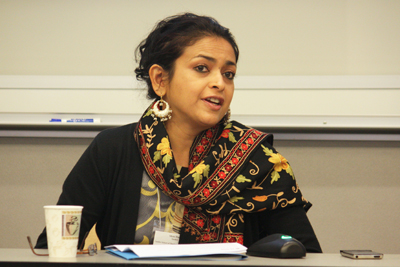2010 Atlanta
CTAUN Conference
Atlanta, March 18, 2010
“Who Needs the United Nations Now?”
Committee on Teaching About the UN (CTAUN)
Candler School of Theology, Emory University
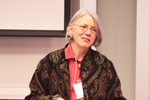
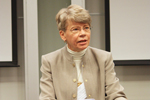
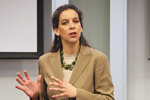
The morning began with greetings by Betsy Rivard, Conference Chair, who listed many of the areas in which the UN works. Following were introductions by Anne-Marie Carlson, Chair of CTAUN, who gave a brief history of our committee, and Andrea White, Assistant Professor of Theology and Culture, who welcomed us to the Candler School of Theology at Emory, and spoke of the school’s commitment to human rights and social justice.
MORNING KEYNOTE:”Shaping Public Perception of the UN”
Eric Falt
The morning keynote address was given by Eric Falt, Director of Outreach in the Department of Public Information (DPI) at the United Nations. He began by speaking about how changes in the name of the conference itself could alter public attitudes toward the organization. Rather than “Who Needs the UN now?” the question could be phrased more reflectively – “How different would the world be if the UN didn’t exist?” He spoke of the importance of engaging audiences. The regular media report on stories that will sell; what goes unnoticed are the stories of people everyday, quietly doing their work in the field. For every civil servant at the UN, there are 100 of these unsung heroes, working at times in dangerous circumstances with local partners, often with great success.
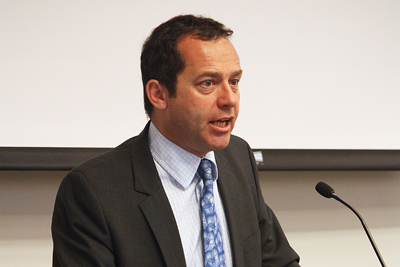
He showed a film, “The UN – It’s Our World” illustrating the history of the UN, how it works, and how through film, UN Radio and TV, and information centers around the world, the Dept. of Public Information attempts to get out the message – the UN’s purpose of “Uniting in Action for the Common Good.” DPI dedicates its programs to particular constituencies, including education.
He spoke of the four basic principles or pillars on which the UN is founded:
- Peace and Security
- Development
- Human Rights
- The Rule of Law
In the area of Peace and Security, the UN focuses heavily on preventive diplomacy, currently working in such countries as the Congo, Somalia, the Central African Republic, the Comoros Islands, Zimbabwe, and Cyprus. In Central Asia, the focus is on terrorism, drug trafficking and managing resources. The Secretary General is involved in establishing a two-state solution in the Middle East, there are peacekeeping operations in 17 countries across 5 continents, and the UN supports governments in 50 states, including Nepal, Iraq, the Maldives, Sierra Leone and Guinea-Bissau in the work of monitoring elections. The UN is also committed to eradicating land mines, rehabilitating child soldiers, and rebuilding national institutions.
In the Development area, he admitted that resources allocated to education are insufficient. In places where one out of six people live on less than $1.00 a day, 70% of resources are focused on agricultural and infrastructural projects and partnerships with local non-governmental organizations (NGOs) and other civil society groups. He quoted from a UN report entitled “Threats, Challenges and Changes” – “There is no security without development, and no development without security.”
Human rights and humanitarian aid are major functions of the UN that receive too little notice. In 2008 alone, the UN dealt with 55 humanitarian emergencies, including pandemics and natural disasters, and human rights issues in 11 countries. There are 400 officers now monitoring situations around the world, with a rapid response unit at UNHCHR (the office of the UN High Commissioner for Human Rights). In the area of Global Health, the UN works to provide clean water and sanitation, vaccinates against smallpox, polio, measles, and malaria, helps farmers harvest food crops, and works with refugees and internally displaced people, providing blankets, mosquito nets, tents and school materials in emergency situations, and medications for AIDS patients. Some 100 UN workers lost their lives in the recent earthquake in Haiti.
On issues involving rule of law, the UN works in 110 countries to strengthen judicial institutions, and in peace building. A 2009 PEW Research poll, which surveyed people in 24 countries, found that, in 17 of those surveyed, the image of the UN is improving, compared with a similar study done in 2007. In Jordan, for example, 44 % of those surveyed were supportive in 2009, compared with 32% in the earlier study. In Egypt, which formerly gave the UN a 55% negative rating, the majority response in 2009 was favorable.
In the more affluent countries the work of the UN is not as obvious as it is in less developed nations. Yet, in the UK, 60% were supportive of UN efforts, and in France the number was even higher – at 74%. 61 % of Americans had a favorable image of the UN in 2009, compared with 48% in 2007. Mr. Falt attributes much of that to the policies of the current administration in the US, and the support of President Obama, especially among young people, where 51% of 18-29 year olds were open and willing to engage, compared with 30% in older age groups. He emphasized the need to continue to encourage young people’s support as future world leaders.
Another possible factor is that there are more Model UNs in the US than elsewhere. A new grass roots initiative, called the Global Model UN, which has been developed by the UN itself, to bring greater authenticity to the program, will be available on the UN website – www.un.org/gmun/ — to 500,000 students worldwide annually. Fifty-seven countries participated in the first Global Model UN, which was held in Geneva; this year’s university level conference will be in Kuala Lumpur from Aug. 14-18, 2010.
The UN targets programs to specific audiences. In addition to Model UN, there are units on the Holocaust and genocide; a program on the impact on society of the transatlantic slave trade was held at the UN on March 25th, and an International Day of Peace will be celebrated in September; the UN has recently begun working with the academic community to develop awareness of issues at the university level – www.academicimpact.org ; using social networking tools, UN4U, will bring senior officials to the schools on UN Day, and also has initiated the Citizen Ambassador project, encouraging contributors to submit a 3 minute video on the question “What would you tell world leaders to do?”
To help meet its 8 Millennium Development Goals (MDGs) of eradicating extreme hunger and poverty, achieving universal primary education, promoting gender equality and empowering women, reducing child mortality, improving maternal health, combating HIV Aids, malaria and other diseases, ensuring environmental sustainability and developing a global partnership for development by the target date of 2015, the UN relies for implementation on its long connection with Non-Governmental Organizations (NGOs) and civil society. In Melbourne, Australia, from August 30 – September 1, 2010, there will be a major NGO conference on Global Health.
The UN also reaches out to the world community through UN Good Will Ambassadors like George Clooney and Wangari Maathai. Yet, until recently, it neglected those popular media which could target a more general audience, i.e. viewers of network TV and film. Now, after conducting a Global Creative Forum with leaders in the film industry, there is the Creative Community Outreach Initiative. What this means is that issues which have a UN focus, e.g. child soldiering, will be included in episodes of popular programs like Law & Order, reinforcing Mr. Falt’s conviction that communicating with people on an emotional level will be more effective in changing attitudes and perceptions. He ended with a request that we, as educators, make the effort to disseminate the message of the UN to those who still remain unconvinced of its usefulness and importance.
MORNING SESSION: “Assistance from the UN and NGOs”
This session involved three groups of speakers, each with a moderator from CTAUN’s Atlanta Steering Committee, addressing three issues of concern:
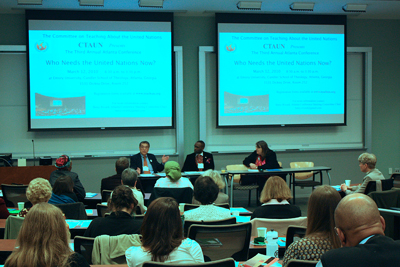
Children:
- Derreck Kayongo, Sr. Advocacy Field Coordinator, CARE International
- Dr.Benjamin Bao– Prof. of Business and Marketing -Strayer University; UNICEF Advisory Board
- Molly Read Woo, journalist, Planet Atlanta – moderator
Children:
Mr. Kayongo
talked about the history of CARE and introduced us to CARE’S novel Global Soap Project, which attempts to collect and recycle the 1 billion bars of soap discarded by hotels every year and distribute them in developing countries.
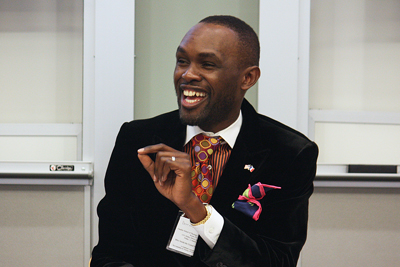
“Women and girls,” he said, “are the key to unlocking poverty.” He added, “Children who are hungry cannot learn, no matter how much you educate them. They are hungry.” He pointed out that the increases in world population since the UN was founded 65 years ago (now somewhere between 6.1 and 6.6 billion people) have significantly increased the challenges for the UN. He spoke of the CARE ACTION NETWORK and appealed to women in the US to register with CARE and become ‘voices for the voiceless’ on issues such as child marriage, since of the 535 members of Congress, only about 10% are women. He can be reached at dkayongo@care.org for information about an upcoming conference (May11-13) on advocacy in Washington, DC.
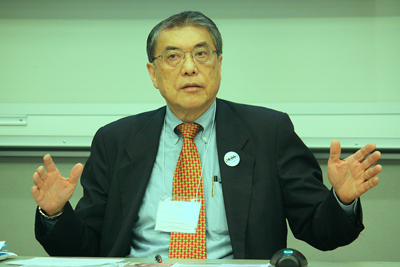
Dr. Bao
reminded us that in the 65 years in which it has been operational, UNICEF has fed 1 billion hungry children, and copes with some 200 emergencies in 28 countries each year. They distribute pins with the number 24,000 – the number of children under the age of 5 who die each year of preventable diseases. Each year, thanks to the efforts of UNICEF, that number is reduced. When asked how locals can become involved, Dr. Bao also focused on fundraising, advocacy and education worldwide. He advised us to find out enough about the organization to start programs in our local institutions, and to make use of the websites www.teachunicef.org which contains a multitude of materials for classroom teachers and www.unicefusa.org/volunteers .
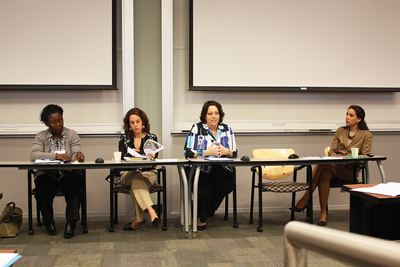
Women:
- Barbara Schreiber,, Director of Membership – Georgia Chapter, United Nations Development Fund for Women (UNIFEM)
- Genia Topple, Executive Director, Rockdale Foundation
- Glory Kilanko, Director & CEO, Women Watch Afrika
- Dr. Andrea White, Professor, Candler School Of Theology – moderator
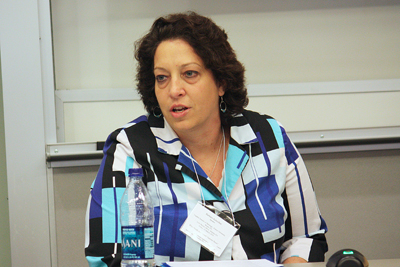
Ms. Schreiber
spoke about the work of UNIFEM, the only department in the UN devoted solely to issues of women and girls. UNIFEM is a grass roots organization and an agency of UNDP – the United Nations Development Program, which works locally by empowering women to empower the society, and is currently fundraising for the Haiti Shelter Program. She mentioned the celebration of International Women’s Day on March 8, and spoke about CEDAW -the Convention on the Elimination of Discrimination Against Women, which the US has not ratified, although the city of San Francisco has.
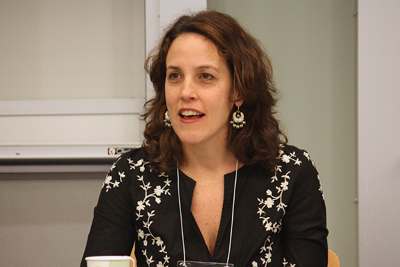
Ms. Topple
spoke about micro finance in the Middle East and North Africa. She concurs with many of her colleagues in the field, when she says that women, with a 98% repayment rate, are much better credit risks than men, relying on peer pressure to insure repayment. She spoke about revolving loans, where women pool their earnings, and all in the group contribute a small portion to one woman in the group each week. Encouraging women to save part of their earnings is a new focus in micro finance, and there is the added bonus that, as family breadwinners, women’s status vis-à-vis male family members has risen.
Traditionally, women without sons lack status, as land can be inherited only by men. Single mothers are equally without benefit. Fetching water and firewood before cooking is also unpaid labor. In Somalia, her organization has empowered such women by setting up an oil and tire change project, run solely by women, to increase their earnings.
She showed a film clip of the Rockdale Foundation’s work with the UN in Yemen, and also mentioned the UN Capital Development Fund, which works with governments to improve educational systems. She mentioned two organizations- Women’s World Banking, which offers lending opportunities for women and Women’s Refugee Network. She can be reached at www.rockdalefdn.org .
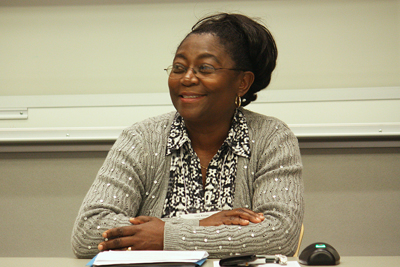
Glory Kilanko
founded Women Watch Afrika in Dakar in 1994, for the advancement of the Convention on the Elimination of Discrimination Against Women (CEDAW). Despite the fact that women are the farmers in most developing nations, 200 million women worldwide suffer from malnutrition. She spoke of the 0-1-0 meal -that is, no breakfast or dinner, and the single meal of the day at lunch, with no seconds. As farmers, these women suffer the additional hazard of exposure to pesticides, which is especially harmful to mothers (typically aged 14-24) with babies. Her organization is working in 6 countries to teach women about this issue. Women Watch Afrika also focuses on child marriage and female genital mutilation.
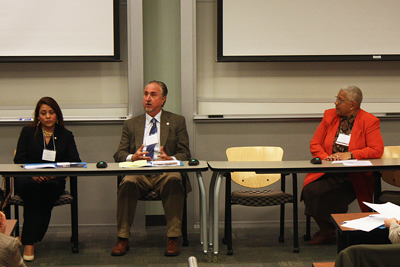
Volunteer Work and Development:
- Kenton Ayres, SE Regional Manager, Peace Corps
- Estrella Merlos, Program Director, CIFAL Atlanta
- Marie Shockley, former Peace Corps Volunteer in Namibia – moderator
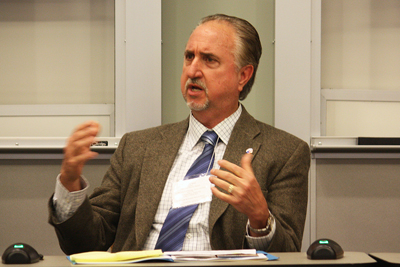
Kenton Ayres
2011 will be the 50th anniversary of the Peace Corps, which works in 76 countries, with 7600 volunteers and is hoping to expand to 10,000 by next year. Its goals are threefold:
- to share technical skills enabling our partners in developing countries to be self-sustaining
- to counter negative images of Americans overseas. “The true heart of America is giving” he says.
- to spread the message and share the Peace Corps experience of other cultures with the home community when the volunteers return.
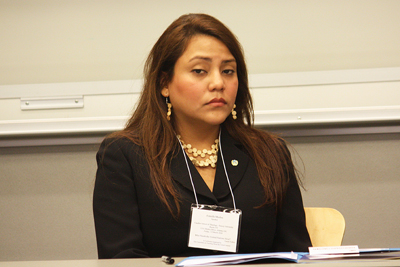
Estrella Merlos
– UNITAR (the United Nations Institute for Training and Research) was started in 1964 to train diplomats. It now has 12 CIFAL centers worldwide, to train local leaders. CIFAL centers exist because the UN believes that its Millennium Development Goals (MDGs) can be achieved through local government. They train approximately 1000
leaders annually.
CIFAL Atlanta, begun in 2004, is a public-private partnership providing venues for academic and business leaders and government officials in the Western hemisphere to exchange best practices in support of the MDGs in areas such as economic and social development, gender equality, environmental sustainability, positioning airports, HIV AIDS management, gender responses to climate change, solid waste and water resources, and making information technology available to people with disabilities, etc. Their website is www.cifalatlanta.org .
AFTERNOON KEYNOTE: “The Changing Nature of Conflict and Children”
Carolina Owens
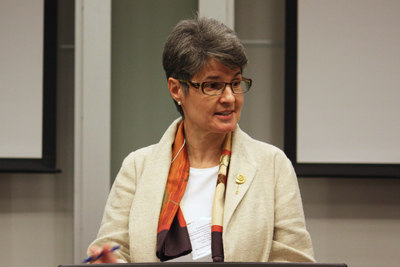
The afternoon keynote address was given by Carolina Owens, Chief of Office, Office of the Special Representative of the Secretary-General for Children and Armed Conflict at the United Nations.
After showing the short DVD “Children and Conflict in a Changing World”, she spoke of the changing nature of war, where today there is a blurring of military and civilian populations, and victimized civilians are dismissed as “collateral damage.” Since 1990, 80% of civilian deaths have been women and children. In the last 20 years, two million children have died, six million have been permanently damaged, and 250,000 have been recruited as child soldiers. In Uganda, girls have been used as sex slaves; in Iraq and Afghanistan there have been incidents of child suicide bombings; in Bosnia, the Democratic Republic of the Congo, and Darfur rape has been used as a tool of war to intimidate communities. Today there are 26 crisis areas in the world where children are being used as tools of war in some manner.
This targeting of civilians is a serious breach of international law. Yet there has been no accountability for any of it. Schools, like hospitals, should be zones of peace, off limits to recruiters. She quoted from a UNESCO report entitled “Education Under Attack” which prioritizes education as a key intervention in keeping children away from recruiters and helping them find stability and healing in their lives. During times of crisis, displaced children need relevant documentation to protect them from discrimination.
Ms. Owens stressed that recruitment leaders must be held accountable; the International Criminal Court and the UN Security Council, in Resolution 1612, have made it a priority issue. She further reiterated the need to insure the survival of children who’ve experienced violence and post-conflict trauma -whether psychological, social or health-related. “It is often the faith-based organizations, “she said, “who remain the longest and are most steadfast in crisis situations.” She also suggested that YouTube has many video resources on these issues.
AFTERNOON PANEL 1: “Interdisciplinary Units Using the UN: A Student’s Perspective”
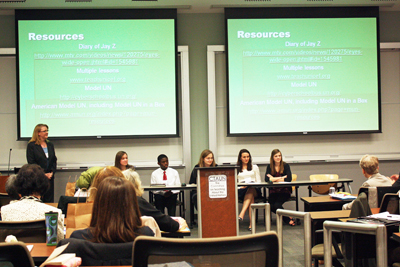
This panel was composed of Jill Stewart, a social studies teacher at North Atlanta High School and coordinator and coach of the school’s Model UN Club, along with 5 of her students. Studying the UN, she told us, “builds rigor without mortis into the curricula” and fosters “high level thinking with ambiguous outcomes.” It helps students to grow in the areas of public speaking, debate, critical thinking, problem solving, writing, consensus building, compromise and cooperation, conflict resolution and to become less self-involved.
These benefits were reiterated by her students, who also spoke of the ‘Water for Life’ Project, where, in learning to experience the difficulties of accessing water in developing countries, students were asked to carry around with them a gallon jug of water for a day and were expected to use it as their only source of water for drinking, hand washing and other needs. Their goal was also to raise funds to purchase “Play Pumps” – a children’s climb-on horseless merry-go-round that spews out water as it rotates. We were told that 3 ½ million or 98% of children in the developing world die of water-related diseases.
AFTERNOON PANEL 2: “The UN and Crisis: Haiti from Every Angle”
- Dr. Henry “Chip” Carey, Professor, Georgia State University, moderator
- Moni Basu, Writer/Editor/CNN International
- Rev. Guyma Noel, Catholic priest, native of Haiti
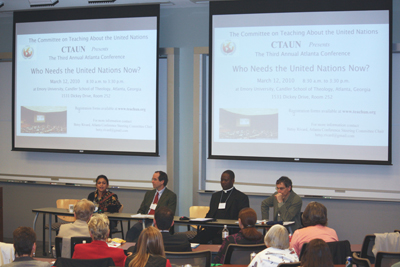
Dr. Eric Mintz, Epidemiologist, Centers for Disease Control and Prevention (CDC)
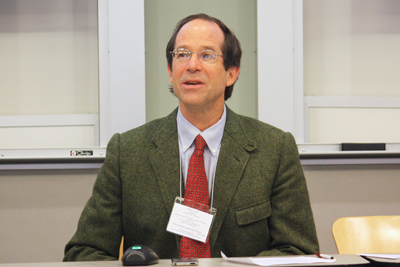
Dr. Carey
has traveled to Haiti many times in the last 25 years. He opened his remarks by noting the 250,000 deaths and 1.5 million homeless since the 2010 earthquake in Haiti began, compounded by imminent losses due to the approaching rainy season, and compared it with the 30,000 deaths in the recent tsunami in South Asia. “Natural disasters,” he said, “account for 10 times the number of losses as man-made disasters.”
He spoke of the ever present need to balance relief work with agricultural development, and of the difficulty in deciding whether to fund NGOs or the government, in whom there is ageneral lack of trust. “There is perhaps too much of relief in the way of handouts,” he told us, “and too little invested in helping the Haitians become self-sustainable.” He further noted that the $1,000,000,000 in US aid to Haiti is about equal to what we spend in Iraq in 2 days.
Ms. Basu
was one of the journalists present in Haiti right after the earthquake. She had previously covered other disasters such as the tsunami in Aceh, Indonesia, but found
the devastation in Port-au-Prince to be unbelievable. She soon learned why others considered the scene unbearable to witness. She described the personal difficulties of being an aid worker in a situation so incomprehensible – e.g. the stench of rotting bodies, the living conditions that led to burnout and the lack of coordination in the early relief efforts. Ms. Basu now felt that the aid situation was working fairly well, but was most concerned about housing, feeling that the “shelter” issue was likely to be a logistical nightmare.
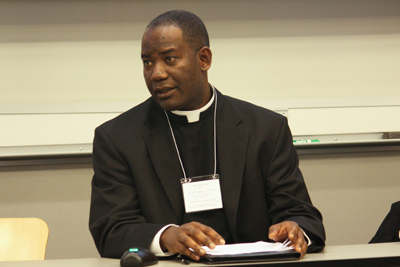
Father Noel
was also critical of the lack of ‘someone in charge’, and stressed that Haitians need a voice in the coordination of programs for rebuilding, requesting a new set of strategies for distributing humanitarian aid. “Political crises in the government cause everything else in a country to stop,” he told us, and compared the Haitian situation with the later earthquake in Chile, where a peaceful transfer of power was actually effected during the time of the quake.
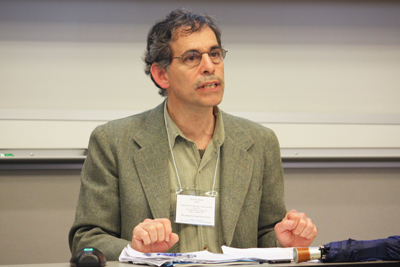
Dr. Mintz
amplified the human tragedy of the situation, and spoke about how impressed he was that people who had had personal losses in their own families, nonetheless, continued to go to work in the relief effort. He spoke of diarrheal infections and water-borne diseases, and aid workers who became cases themselves, contracting malaria related to their living in tent communities. Problems existed even before the quake – the school lunch program fed children, but only 25% were in school.
The CDC provides water purification tablets, and is currently working on a local program of pre-emergency strategies, using pre-existing local institutions. He noted some of the major organizations committed to improving the situation in Haiti, and deserving of donations: World Vision, Partners in Health, Catholic Relief Services, Care International, Oxfam, and Médecins Sans Frontières (Doctors without Borders).
Editor & Coordinator – Antonia M. Giangrande
Assistants – Grace Murphy, Lochie Musso & Staci Dent

